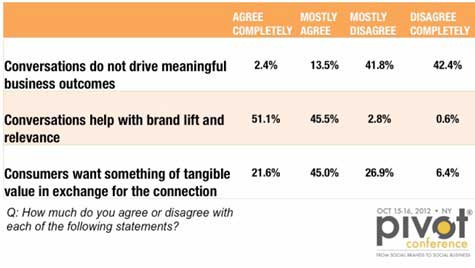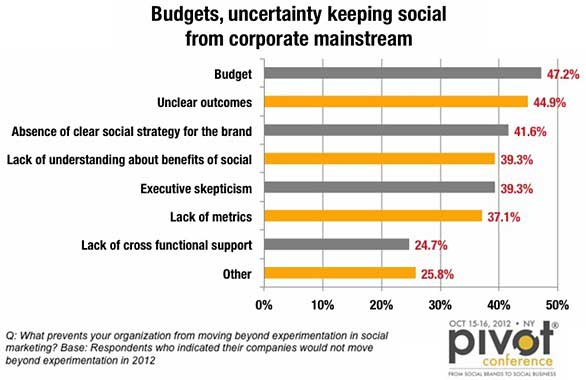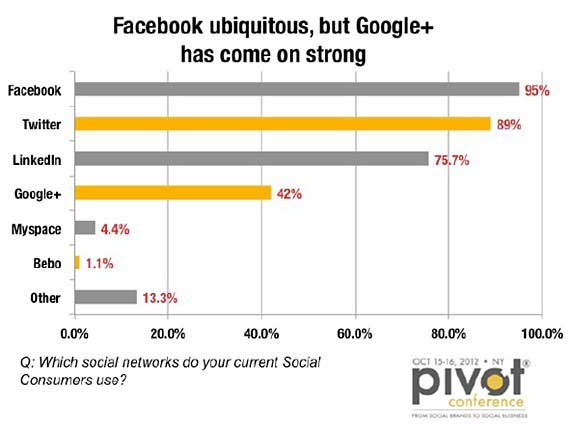Brand managers are split on the current state of social marketing in their organizations: 50.8% say marketing via social media is already mainstream or will become so by the end of 2012, but nearly an equal proportion (49.2%) say social marketing will likely still be characterized by continued experimentation by the year-end, according to a report by the 2012 Pivot Conference and Brian Solis.

Social marketing may be on the cusp of mainstream, but even so, most (89%) brand managers say experimentation is a permanent fixture of social media marketing.
Below, additional findings from The State of Social Marketing 2011-2012, by Brian Solis, conference producer of The 2012 Pivot Conference, and the Pivot team.
Benefits of Social
Nearly all brand managers are positive about the benefits of social marketing: 51.1% agree completely and 45.5% agree mostly that social conversations help with brand lift and relevance. But providing value is key: Two-thirds agree completely (21.6%) or agree mostly (45.0%) that consumers want something of tangible value in exchange for connecting via social channels.

Only 15.9% of brand managers say social conversations do not drive meaningful business outcomes.
How Brands Understand the Social Consumer*
More than three-quarters (76.8%) of brand managers say they have a clear picture of who their social consumer is, but more than one-half (53.0%) haven't really asked consumers about their expectations for social engagement; 34.8% have asked such questions.
Asked what types of benefits social consumers expect from brands, brand managers cite the following top 5:
- Customer service: 59.1%
- Insight to help make decisions: 57.5%
- Ability to learn about new products: 53.0%
- Deals and promotions: 52.5%
- Loyalty rewards for engagement: 44.8%
Among brand managers who report their social marketing efforts will not likely move beyond experimentation in 2012, budgets (47.2%), uncertainty about outcomes (44.9%), and lack of clear strategy (41.6%) are the biggest factors holding social marketing back from entering the organizational mainstream.

Lack of buy-in—both at the executive (39.3%) and cross-functional (24.7%) levels is less of an issue among brand managers.
Top Channels
Asked to identify which platforms their social consumers use, Facebook and Twitter are ubiquitous, boasting penetration levels of 95% and 89%, respectively; but Google+ already (as of October 2011) shows strength (42%).

LinkedIn (75.7%) also enjoys strong penetration among this social-savvy set.
When it comes to social consumers' mobile activity, Facebook Mobile (85.3%) and Twitter Mobile (82.5%) still maintain the top 2 spots. Foursquare (48.6%), however, jumps into the third spot ahead of LinkedIn Mobile (36.7%).
*For the study, a social consumer is defined as someone who first goes to their social networks of relevance to learn about products and services. Social consumers emphasize the input of those who define their interest graph—like-minded individuals on any given subject who share common interests and experiences with them. In this way, social consumers evaluate the shared experiences of those they trust, and expect businesses to respond to their socialized questions.
About the data: Findings are from a survey of 181 brand managers, agency professionals, and experts conducted by The Hudson Group in October 2011.



